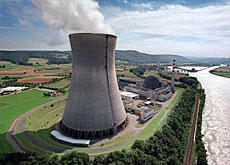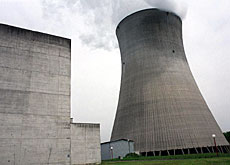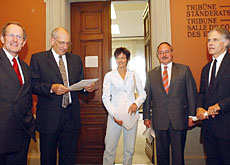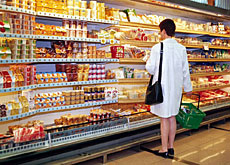Marathon vote failed to resolve nuclear dilemma

Most Swiss are against building new nuclear power stations, despite rejecting a moratorium on new plants in a nationwide vote on May 18.
Analysis of the “marathon” ballot on nine issues has shown that people were often confused, apprehensive or ignorant about the proposed changes.
The government opposed separate proposals to extend the existing moratorium on building new plants and to shut down the industry by 2014.
Around 60 per cent of voters were swayed by the government’s campaign and threw out the two anti-nuclear reforms.
But a study, conducted by political scientists at the University of Zurich and by the GfS Research Institute, found that around a third of the 2,000 people interviewed before and after the ballot voted “with a clear lack of awareness of the [nuclear] issue”.
Voters also came out against seven other proposals, covering everything from healthcare and disabled rights to fairer rents for tenants and car-free Sundays.
Renewable energy
Although the poll showed that the majority of voters agreed with some of the arguments put forward by the Left, they were afraid that electricity would become far more expensive.
At the moment, Switzerland has a “mix” of 40 per cent nuclear power and the rest hydropower.
The anti-nuclear lobby had argued for greater use of renewable sources of electricity, such as wind and solar power, but they failed to get their message across on May 18.
According to the study, voters’ reaction to most of the other issues reflected their uncertainty about the feasibility and the cost effectiveness of the reforms.
Voting pattern
Researchers said a larger number of voters than usual had trouble remembering the issues.
For example, the plan to introduce means-tested health insurance policies produced a great deal of confusion because of the complex way the issue was presented.
Some of the centre-left Social Democrats’ own supporters failed to support the reforms, with only 59 per cent of them voting “yes”.
The poll also revealed that the “no” vote to health reforms was probably due to a deep uncertainty about the financial consequences.
Reducing the size of the army and civil defence system got a “yes” from voters of all political persuasions, according to the study.
It said people accepted the reforms to the Swiss army because they could not see an alternative and did not want to maintain the status quo.
The researchers, however, could not determine the truth of the much debated claim that voters were overwhelmed by the record number of issues they had to tackle on the same day.
swissinfo with agencies
Unlike in 1990, the lobby groups, “Non-nuclear Electricity” and “Morataorium Plus” were unable to get more votes than beyond its expected “left” and “green” circle of supporters.
The Zurich study maintains the contradiction between the ballot result and the documented anti-nuclear attitudes, is due to a “major lack of knowledge” of the issue.
The “no” vote for the other seven initiatives was also put down to apprehension and concern about the feasibility and cost effectiveness of reforms.

In compliance with the JTI standards
More: SWI swissinfo.ch certified by the Journalism Trust Initiative



You can find an overview of ongoing debates with our journalists here. Please join us!
If you want to start a conversation about a topic raised in this article or want to report factual errors, email us at english@swissinfo.ch.